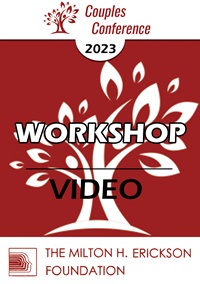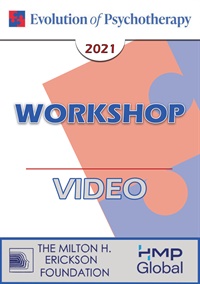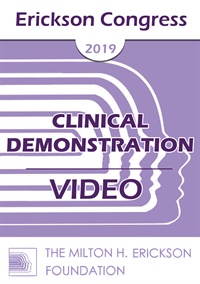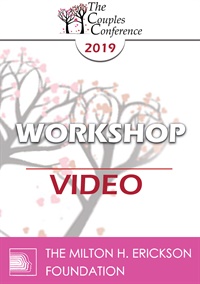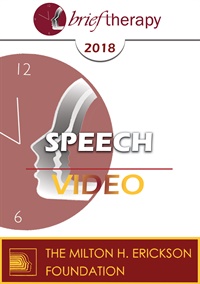- Average Rating:
- Not yet rated
- Topic Areas:
- Keynotes | Couples Therapy | Relational Life Therapy Model (RLT) | Social Issues
- Bundle(s):
- 2024 Couples Conference Bundle
- Categories:
- Couples Conference | Couples Conference 2024 | Pioneers in Couples and Family Therapy
- Faculty:
- Terry Real, LICSW
- Course Levels:
- Master Degree or Higher in Health-Related Field
- Duration:
- 1:02:49
- Format:
- Audio and Video
- Original Program Date:
- May 03, 2024
- Short Description:
- This talk examines the global rise of patriarchy and its impact on intimate relationships, highlighting how anti-relational culture contributes to high failure rates in long-term partnerships. The speaker presents Relational Life Therapy (RLT) as a solution, built on three phases: loving confrontation, trauma work, and skill-building. Emphasizing the need to teach relational skills in schools, the approach addresses both individual challenges—like grandiosity and shame—and broader systemic influences to build healthier, more connected relationships.
- Price:
- $59.00 - Base Price
- Average Rating:
- Not yet rated
- Topic Areas:
- Workshops | Relational Life Therapy Model (RLT) | Couples Therapy | Trauma
- Categories:
- Couples Conference | Couples Conference 2023 | Pioneers in Couples and Family Therapy
- Faculty:
- Terry Real, LICSW
- Course Levels:
- Master Degree or Higher in Health-Related Field
- Duration:
- 1:20:18
- Format:
- Audio and Video
- Original Program Date:
- May 05, 2023
- Short Description:
- This workshop presents Relational Life Therapy (RLT), a powerful couples therapy model that integrates deep individual work—such as trauma healing and character transformation—within the presence of a partner. Blending loving confrontation, relational skills training, and inner child work, RLT produces rapid, lasting change. Core concepts include addressing shame and grandiosity, using the wise adult/wounded child/adaptive child framework, and applying empathic reversal to build compassion, accountability, and authentic connection.
- Price:
- $59.00 - Base Price
- Average Rating:
- Not yet rated
- Topic Areas:
- Workshops | Family Systems | Social Psychology | Therapist Techniques
- Categories:
- Evolution of Psychotherapy | Evolution of Psychotherapy 2021 | Pioneers in Couples and Family Therapy
- Faculty:
- Ellyn Bader, PhD
- Course Levels:
- Master Degree or Higher in Health-Related Field
- Duration:
- 2 hours
- Format:
- Audio and Video
- Original Program Date:
- Dec 03, 2021
- Short Description:
- Ellyn Bader presents her developmental model for couples therapy, focusing on treating trauma through structured communication techniques. She demonstrates how therapists can help couples overcome developmental challenges, build self-differentiation, and heal from various traumatic experiences using the initiator-inquirer method. The approach supports emotional growth, empathy, and rebuilding intimacy by guiding partners to understand themselves and each other more deeply.
- Price:
- $59.00 - Base Price
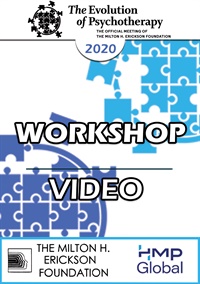
- Average Rating:
- Not yet rated
- Topic Areas:
- Couples Therapy | Infidelity | Workshops | Marriage | Psychotherapy | Relationships
- Categories:
- Evolution of Psychotherapy | Evolution of Psychotherapy 2020 | Pioneers in Couples and Family Therapy
- Faculty:
- Ellyn Bader, PhD
- Course Levels:
- Master Degree or Higher in Health-Related Field
- Duration:
- 2 hours
- Format:
- Audio and Video
- Original Program Date:
- Dec 09, 2020
- Short Description:
- A guide to therapeutic strategies for addressing infidelity, examining the emotional complexities and relationship dynamics that emerge after betrayal. Bader offers practical guidance for therapists working with couples, focusing on rebuilding trust, understanding individual psychological patterns, and supporting partners through healing and potential relationship transformation.
- Price:
-
Sale is $29.00
price reduced from Base Price - $59.00
Tags: LGBTQ Emotional Coping Interpersonal Development Relationship Recovery Psychotherapeutic Framework Cognitive Dissonance Interpersonal Growth Client Sessions Betrayal Commitment Infidelity Self-Accountability Trust Emotional Transparency Crisis Management Dishonesty Emotional Healing Empathy Development Self-Regulation Trauma Therapy Planning
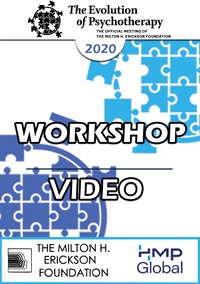
- Average Rating:
- Not yet rated
- Topic Areas:
- Trauma | Workshops | Art and Creativity | Social Psychology | Polyvagal Theory | Psychotherapy | Music | Psychology
- Categories:
- Evolution of Psychotherapy | Evolution of Psychotherapy 2020
- Faculty:
- Stephen Porges, PhD
- Course Levels:
- Master Degree or Higher in Health-Related Field
- Duration:
- 2 hours
- Format:
- Audio and Video
- Original Program Date:
- Dec 09, 2020
- Short Description:
- This presentation will focus on how Polyvagal Theory provides a plausible model to explain how and why intonation of voice and vocal music can support mental and physical health and enhance function during compromised states associated with illness, chronic stress, and trauma. The workshop will elaborate on the principles incorporated in the Safe and Sound Protocol™ and the lessons learned through preliminary clinical trials, current research, and feedback from clinicians applying the protocol to various clinical disorders including individuals with severe trauma histories.
- Price:
-
Sale is $29.00
price reduced from Base Price - $59.00
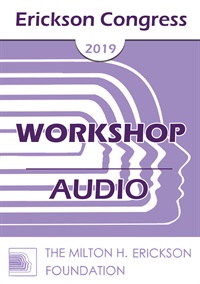
- Average Rating:
- Not yet rated
- Topic Areas:
- Workshops | Mind-Body | Trauma | Pain and Healing | Mindfulness | Somatic Experiences | Ericksonian Hypnosis and Therapy Techniques | Hypnosis
- Categories:
- Erickson Congress | Erickson Congress 2019
- Faculty:
- Ronald Alexander, PhD
- Duration:
- 2 Hours
- Format:
- Audio Only
- Original Program Date:
- Dec 15, 2019
- Short Description:
- This workshop will address the treatment of trauma by utilizing Ericksonian Hypnosis, Somatic Experiencing and Mindfulness practices for accessing the unconscious and activating inner resources with somatic experiencing, mindfulness and trance. These three unique orientations emphasize a unified mind body healing approach that appreciates utilization as an orientation that understands the importance of the symptom as a pathway to inner healing.
- Price:
- $15.00 - Base Price
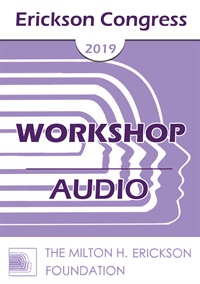
- Average Rating:
- Not yet rated
- Topic Areas:
- Workshops | Trauma | Therapeutic Relationship | Therapist Development
- Categories:
- Erickson Congress | Erickson Congress 2019
- Faculty:
- John Beahrs, MD
- Duration:
- 1 Hour 59 Minutes
- Format:
- Audio Only
- Original Program Date:
- Dec 15, 2019
- Short Description:
- Ratifying victimhood often paradoxically sensitizes to trauma’s effects, and is heavily reinforced socially. Therapists are challenged to help victims restore personal agency and accountability, without denying victimhood. Contracting for roles and boundaries precedes efforts to interdict traumatic re-enactment, redefine personal and social identity, access locus of control, and restore accountability.
- Price:
- $15.00 - Base Price
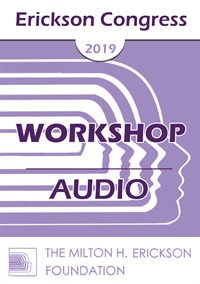
- Average Rating:
- Not yet rated
- Topic Areas:
- Workshops | Trauma | Experiential Therapy | Polyvagal Theory
- Categories:
- Erickson Congress | Erickson Congress 2019
- Faculty:
- Maggie Phillips, PhD
- Duration:
- 1 Hour 57 Minutes
- Format:
- Audio Only
- Original Program Date:
- Dec 15, 2019
- Short Description:
- This workshop presents a 3-Step Model for creating effective corrective experiences for traumatized clients. These steps are Hypnosomatic Resourcing, Re-regulating Nervous System Responses to Post-traumatic Triggering, and Repairing and Rewiring through Enduring Self-integration and Secure Attachment with Self and Others for Permanent Change. We will explore how to help clients shift from more passive responses in their lives to the use of action systems.
- Price:
- $15.00 - Base Price
Tags: Experiential Polyvagal Trauma
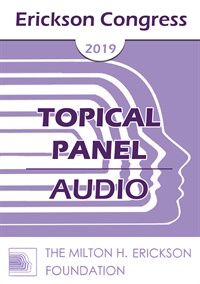
- Average Rating:
- Not yet rated
- Topic Areas:
- Topical Panels | Trauma | Post-Traumatic Stress Disorder (PTSD)
- Categories:
- Erickson Congress | Erickson Congress 2019
- Faculty:
- John Beahrs, MD | Stephen Gilligan, PhD | Camillo Loriedo, MD, PhD | Teresa Robles, MA, PhD
- Duration:
- 58 Minutes
- Format:
- Audio Only
- Original Program Date:
- Dec 14, 2019
- Short Description:
- Posttraumatic stress disorder consists of a complex of symptoms including hyper arousal, social withdrawal and intrusions. The panelists will describe commonalities and differences in their approach to PTSD.
- Price:
- $15.00 - Base Price
- Average Rating:
- Not yet rated
- Topic Areas:
- Clinical Demonstrations | Storytelling | Trauma
- Categories:
- Erickson Congress | Erickson Congress 2019
- Faculty:
- Robert Schwarz, PsyD
- Course Levels:
- Master Degree or Higher in Health-Related Field
- Duration:
- 1 Hour 2 Minutes
- Format:
- Audio and Video
- Original Program Date:
- Dec 14, 2019
- Short Description:
- This demonstration will focus on using Emotional Freedom Techniques to treat the negative affect of a traumatic or stressful incident followed by using Narrative approaches and imagery to integrate changes into the clients life and identity.
- Price:
-
Sale is $29.00
price reduced from Base Price - $59.00
Tags: Storytelling Trauma
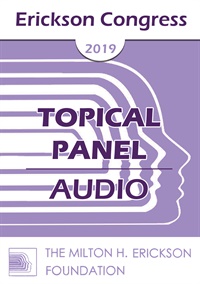
- Average Rating:
- Not yet rated
- Topic Areas:
- Topical Panels | Trauma | Post-Traumatic Stress Disorder (PTSD)
- Categories:
- Erickson Congress | Erickson Congress 2019
- Faculty:
- Ronald Alexander, PhD | Maggie Phillips, PhD | Robert Schwarz, PsyD
- Duration:
- 55 Minutes
- Format:
- Audio Only
- Original Program Date:
- Dec 14, 2019
- Short Description:
- Post-traumatic stress disorder consists of a complex of symptoms including hyper arousal, social withdrawal and intrusions. The panelists will describe commonalities and differences in their approach to PTSD.
- Price:
- $15.00 - Base Price
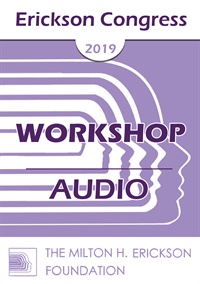
- Average Rating:
- Not yet rated
- Topic Areas:
- Workshops | Post-Traumatic Stress Disorder (PTSD) | Trauma
- Categories:
- Erickson Congress | Erickson Congress 2019
- Faculty:
- John Beahrs, MD | Bill O'Hanlon, MS | Michael Yapko, PhD | Jeffrey Zeig, PhD
- Duration:
- 1 Hour 57 Minutes
- Format:
- Audio Only
- Original Program Date:
- Dec 13, 2019
- Short Description:
- “Traumatophobia” is fear of fear itself, sensitizing people to the psychological effects of stressors such as crime, terror, and hurtful communications. Paradoxically, increasing knowledge of trauma has not empowered, but sensitized us to it — thereby amplifying its effects. The Institute of Medicine challenged society to examine this process, and redirect our knowledge toward building resilience.
- Price:
- $15.00 - Base Price
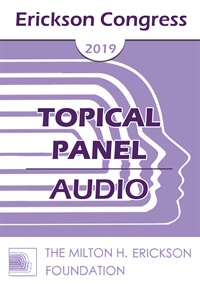
- Average Rating:
- Not yet rated
- Topic Areas:
- Workshops | Dissociation | Trauma | Hypnosis | Therapeutic Relationship
- Categories:
- Erickson Congress | Erickson Congress 2019
- Faculty:
- Camillo Loriedo, MD, PhD
- Duration:
- 1 Hour 54 Minutes
- Format:
- Audio Only
- Original Program Date:
- Dec 13, 2019
- Short Description:
- Dissociation can be described as the failure to integrate information and self-attributions that should ordinarily be integrated, and as alterations of consciousness characterized by a sense of detachment from the self and/or the environment. The strong connection between Hypnosis and Dissociation is known since the time of Pierre Janet's pioneer work. Dissociative hypnotic intervention demonstrated to be very useful in treating pain, anxiety disorders and many other conditions.
- Price:
- $15.00 - Base Price
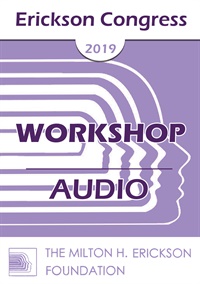
- Average Rating:
- Not yet rated
- Topic Areas:
- Workshops | Energy Psychology | Ericksonian Hypnosis and Therapy Techniques | Hypnosis | Trauma | Psychology | Brief Therapy | Mind-Body
- Categories:
- Erickson Congress | Erickson Congress 2019
- Faculty:
- Robert Schwarz, PsyD
- Duration:
- 1 Hour 54 Minutes
- Format:
- Audio Only
- Original Program Date:
- Dec 13, 2019
- Short Description:
- Energy Psychology (EP) techniques are easy to learn, safe/non-abreactive, evidenced-based, brief approaches, used for everything from bullying to rape to PTSD in veterans to survivors of genocide in Rwanda. Ericksonian Hypnosis and Energy Psychology are brief mind body approaches for treating trauma that both utilize interpersonal neurobiology and memory reconsolidation. We will rapidly review the research and theory supporting them. Then we will focus on teaching you the basics of using emotional freedom techniques (EFT-tapping) within a trauma informed framework and integrating it with Ericksonian principles.
- Price:
- $15.00 - Base Price
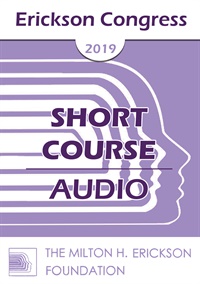
- Average Rating:
- Not yet rated
- Topic Areas:
- Short Courses | Depression | Trauma | Seeding | Therapeutic Relationship
- Categories:
- Erickson Congress | Erickson Congress 2019
- Faculty:
- Robert Wubbolding, EdD
- Duration:
- 1 Hour 24 Minutes
- Format:
- Audio Only
- Original Program Date:
- Dec 12, 2019
- Short Description:
- The American novelist William Faulkner stated, "The Past is never dead. In fact, it is not even past." This presentation emphasizes the unconventional use of reality therapy that connects the past with the presents by helping clients realize that their current behaviors are normal responses to abnormal situations that they have experienced. It also operationalizes the Ericksonian principle: "The solution often appears unrelated to the problem."
- Price:
- $15.00 - Base Price
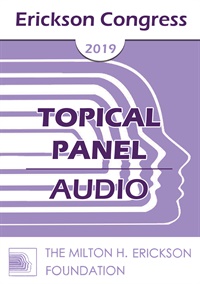
- Average Rating:
- Not yet rated
- Topic Areas:
- Workshops | Hypnosis | Future Oriented | Post-Traumatic Stress Disorder (PTSD) | Resources | Trauma | Hypnotherapy
- Categories:
- Erickson Congress | Erickson Congress 2019
- Faculty:
- Consuelo Casula, Dipl. Psych
- Duration:
- 1 Hour 49 Minutes
- Format:
- Audio Only
- Original Program Date:
- Dec 12, 2019
- Short Description:
- During our entire life - from adolescence to old age- we face transition phases, changes and passages going towards the future. During life passages hypnosis can help to harmonize the process of losses and winnings, change and adaptation, crisis and opportunity. The workshop will show a hypnotherapeutic model based on the identification of the resources of the present with which to revisit the traumas of the past and then turn to the future with hope and resiliency.
- Price:
- $15.00 - Base Price
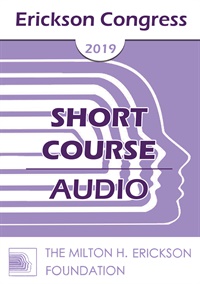
- Average Rating:
- Not yet rated
- Topic Areas:
- Short Courses | Abuse | Post-Traumatic Stress Disorder (PTSD) | Psychology | Psychotherapy | Trauma
- Categories:
- Erickson Congress | Erickson Congress 2019
- Faculty:
- Patrick McCarthy, MBCHB
- Duration:
- 1 Hour 19 Minutes
- Format:
- Audio Only
- Original Program Date:
- Dec 12, 2019
- Short Description:
- This exercise allows people to park all of their problems without any disclosure of their problems. Complete privacy. There is no need to discuss thir problems at all. The micro-structure of the session will be explored to show the various safety devices used. This astonishing exercise can be used for PTSD, abuse, trauma, losing car keys, financial concerns, i.e. absolutely anything! It received a great reception at the ISH meeting in Montreal.
- Price:
- $15.00 - Base Price
Tags: Abuse Psychology Psychotherapy PTSD Trauma
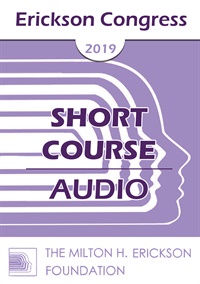
- Average Rating:
- Not yet rated
- Topic Areas:
- Short Courses | Pain and Healing | Tailoring | Trauma
- Categories:
- Erickson Congress | Erickson Congress 2019
- Faculty:
- James Keyes, PhD
- Duration:
- 1 Hour 32 Minutes
- Format:
- Audio Only
- Original Program Date:
- Dec 12, 2019
- Short Description:
- During this presentation, the development of chronic pain syndromes and some practical interventions will be discussed. Specifically, assessing patient's current functioning within a "whole-person approach" will allow clinicians better information about where to begin assisting with change. While using the "evidence-based treatments" as a starting point, finding ways to tailor the intervention to the individual will be reviewed. We will honor the long-history of hypnosis being used to treat chronic pain. Finally, we will review outcome research indicating what seems to make the most effect for patients with pain.
- Price:
- $15.00 - Base Price
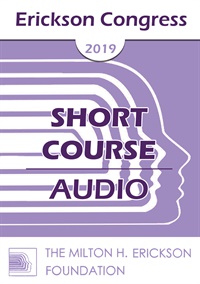
- Average Rating:
- Not yet rated
- Topic Areas:
- Short Courses | Utilization | Trauma | Ericksonian Hypnosis and Therapy Techniques
- Categories:
- Erickson Congress | Erickson Congress 2019
- Faculty:
- Stefanie Badenhorst, D Litt
- Duration:
- 1 Hour 28 Minutes
- Format:
- Audio Only
- Original Program Date:
- Dec 12, 2019
- Short Description:
- It has become increasingly documented that the vast majority of patients with adult pathology, reported experiences of severe childhood trauma. Early appropriate therapeutic intervention can relieve symptoms and prevent adjustment difficulties and pathology. A theoretical overview of the effect of trauma will explain the process of dissociation as a coping mechanism to deal with overwhelming experiences. The child dissociates from feelings and memories associated with trauma in order to survive emotionally. The dissociation is initially helpful and enables the individual to cope, however eventually it can result in pathology and become destructive.
- Price:
- $15.00 - Base Price
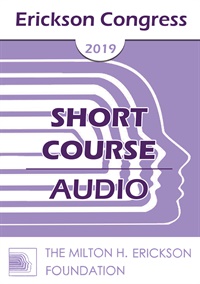
- Average Rating:
- Not yet rated
- Topic Areas:
- Short Courses | Trauma | Awareness Integration Model | Relationships
- Categories:
- Erickson Congress | Erickson Congress 2019
- Faculty:
- Foojan Zeine, Psy.D., MFT
- Duration:
- 1 Hour 28 Minutes
- Format:
- Audio Only
- Original Program Date:
- Dec 12, 2019
- Short Description:
- The effect of Traumas can persist throughout a person's lifespan and across different areas such as work, finances, intimate relationship, sexuality, relationship with body, and people at large. Beside building resiliency to reenter life's day to day activities, releasing of many beliefs that get created at the time of the trauma about the self and the world is necessary for the traumatic effect and impact to move from destructiveness to constructing life.
- Price:
- $15.00 - Base Price
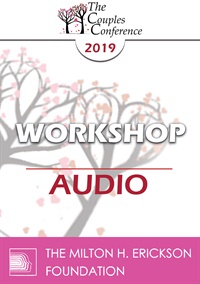
- Average Rating:
- Not yet rated
- Topic Areas:
- Workshops | Couples Therapy | Relational Life Therapy Model (RLT) | Gender | Trauma
- Bundle(s):
- CC19 Main Conference Audio Bundle | CC19 Individual Selections
- Categories:
- Couples Conference | Couples Conference 2019 | Pioneers in Couples and Family Therapy
- Faculty:
- Terry Real, LICSW
- Duration:
- 1:02:19
- Format:
- Audio Only
- Original Program Date:
- Apr 12, 2019
- Short Description:
- This presentation outlines the core phases of Relational Life Therapy (RLT): confronting dysfunctional patterns, inner child work, and teaching relational skills. Emphasizing extended sessions and multi-generational trauma, the approach targets power imbalances, grandiosity, and false empowerment. The goal is to foster deep connection and sustainable change through truth-telling, accurate diagnosis, and strategic leverage.
- Price:
- $15.00 - Base Price
Credit available - Click Here for more information
- Average Rating:
- Not yet rated
- Topic Areas:
- Workshops | Couples Therapy | Relational Life Therapy Model (RLT) | Gender | Trauma
- Bundle(s):
- CC19 Main Conference Video Bundle | CC19 Individual Selections
- Categories:
- Couples Conference | Couples Conference 2019 | Online Continuing Education | Pioneers in Couples and Family Therapy
- Faculty:
- Terry Real, LICSW
- Course Levels:
- Master Degree or Higher in Health-Related Field
- Duration:
- 1:04:21
- Format:
- Audio and Video
- Original Program Date:
- Apr 12, 2019
- Short Description:
- This session introduces the fundamentals of Relational Life Therapy (RLT), emphasizing a collaborative, non-confrontational approach between therapist and client. Key concepts include sustaining dialogue, identifying internal parts (functional adult, wounded child, adaptive child), and using techniques like psychodrama to address multi-generational trauma. The importance of treating psychiatric conditions before engaging in deeper emotional work is also underscored.
- Price:
-
Sale is $29.00
price reduced from Base Price - $59.00
Credit available - Click Here for more information
- Average Rating:
- Not yet rated
- Topic Areas:
- Speeches | Trauma | Brief Therapy | Future Oriented | Post-Traumatic Stress Disorder (PTSD)
- Categories:
- Brief Therapy Conference | Brief Therapy Conference 2018 | Online Continuing Education
- Faculty:
- Bill O'Hanlon, MS
- Course Levels:
- Master Degree or Higher in Health-Related Field
- Duration:
- 57:49
- Format:
- Audio and Video
- Original Program Date:
- Dec 09, 2018
- Short Description:
- People with post-traumatic stress often suffer for years and develop a variety of troubling and often crippling problems. This talk will detail a philosophy and methods of working briefly and effectively with people who have been traumatized. An array of new methods have shown that previous conceptions and methods of working with trauma are unnecessarily long-term and re-traumatizing. These new approaches, rather than being based on the past and deterministic models, are oriented towards the present and future and a sense of possibilities. You will leave equipped with a different understanding of how to treat trauma and four specific methods you can use right away in your work.
- Price:
-
Sale is $29.00
price reduced from Base Price - $59.00
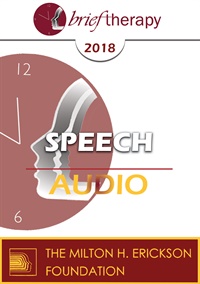
- Average Rating:
- Not yet rated
- Topic Areas:
- Speeches | Trauma | Neurobiology | Neuroscience | Research | Addiction | Memory
- Categories:
- Brief Therapy Conference | Brief Therapy Conference 2018 | Pioneers in Couples and Family Therapy
- Faculty:
- Janina Fisher, PhD
- Duration:
- 1:05:26
- Format:
- Audio Only
- Original Program Date:
- Dec 09, 2018
- Short Description:
- Janina Fisher explores how traumatic memories continue to impact individuals through persistent symptoms like depression and anxiety. She introduces the concept of implicit memory, explaining how emotional and visceral memories shape current behavior. Fisher offers practical techniques for helping clients understand their trauma responses, emphasizing a transformational approach that focuses on healing and creating new experiences rather than reliving past events.
- Price:
- $15.00 - Base Price
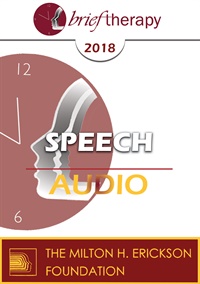
- Average Rating:
- Not yet rated
- Topic Areas:
- Speeches | Brief Therapy | Trauma | Anxiety | Hypnosis | Pain and Healing | Dissociation
- Categories:
- Brief Therapy Conference | Brief Therapy Conference 2018
- Faculty:
- Camillo Loriedo, MD, PhD
- Duration:
- 1:00:42
- Format:
- Audio Only
- Original Program Date:
- Dec 09, 2018
- Short Description:
- Dissociative hypnotic intervention demonstrated to be very useful in treating pain, anxiety disorders and many other conditions. But hypnosis can as well reactivate the natural mind processes, contributing to reconnect different parts (distinct modes of information processing) into a functional and unified self, particularly after traumatic experiences. Rapport, the special relationship that produces intense interpersonal links and connections, as well as profound disconnections with non-hypnotic reality, can be considered a crucial factor of brief therapeutic approach to dissociative conditions and trauma. How to use rapport as well as other new specific therapeutic interventions to reestablish the natural integrative links in a dissociative mind and relationship will be outlined in this presentation.
- Price:
- $15.00 - Base Price



